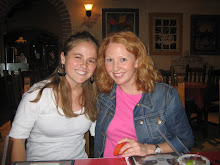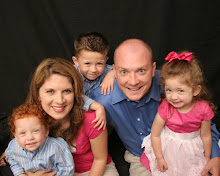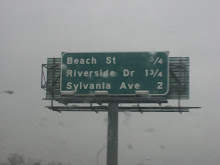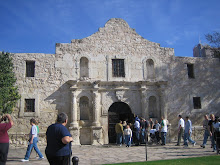Well today was very uneventful. The 6th graders were taking a quiz and then doing lifework in math and the 5th graders were taking a science benchmark for the whole day. I ended up having a chance to read for one of the college classes I'm taking. [To be considered a full time student for insurance and scholarships, I had to enroll in 12 credit hours so I'm taking Behavior Modification, Theories in Counseling and Psychotherapy, an Internship, and an Independent Study.] At 10:30 I was interviewed by Lizzy, who is putting together a video to showcase Joyce's teaching style. KIPP was awarded $10,000 for their math program and as part of the grant they have to present the outstanding method or technique to the rest of San Antonio. The goal is to spread good ideas to improve the education system. They have filmed about 7 hours of Joyce's class and Lizzy is creating a 12 min. video to share with San Antonio and the rest of the world. They were going to have a focus group come to observe Joyce's class to ask questions and explain the differences between her class and a typical math classroom. The focus group fell through and so when Lizzy found out about me, she decided I would be just as good.
Here are some of the questions she asked and my answers:
1. What differences do you see between Joyce's classroom and other math classrooms you have observed? The most obvious difference is student engagement. These students are interested in the topic at hand which makes them want to participate by discussing math concepts. The students do a majority of the talking. Joyce simply guides their thinking.
2. What have you learned from Joyce? I have learned that the goal should be to get students to think math, not simply do math. If they can explain the concepts and defend their ideas, they are gaining so much more than math knowledge. They are gaining confidence to sharing their ideas as well as interest in school and the world around them. I have also learned to be flexible with lesson plans. If the students are interested in tomorrow's lesson, take advantage of it and let them learn about it.
3. Would you change anything about the way Joyce teaches? I would only change note organization. I think it is important to give them an outline and help them organize the information. I agree that the definition should not be written on the board, but maybe just the vocab word so they know they need to write it and put a definition in their own words.
4. Do you think this teaching style could work without the strict culture of KIPP? I think it would be more difficult. Students may be less likely to take the risk of expressing their ideas for fear of being bullied. They may not want to challenge another student's idea. I think it takes an accepting community of students to be able to explore math in this way.
5. Why might this technique be difficult for other teachers? Well, some teachers may not have had the opportunity to observe this type of teaching. They may not know it exists. It might also be easier to take strict notes with specific examples to present to the class, instead of taking the risk of having a student ask a question they can't answer. If a student tries to solve a problem the wrong way, Joyce can redirect their thinking. She can understand quickly where their thought processes came from and explain them back to the right path. Not everyone can do that. This technique would also be difficult to implement in the 10th grade. I believe it would be best to introduce it to students in 5th or 6th grade before their learning patterns are formed. I will tell you from my own point of view, if a teacher came in during my 10th grade year and asked me to 'talk' about math in the way Joyce does, I would have lost it. My way had been working just fine, I was getting by, I didn't need a new way because it would have been difficult to retrain my brain.
6. What are the steps to take to make this technique happen? The first thing you need is student interest. If the material is not related to their lives, they will not be interested enough to talk about it. It is not a requirement in other schools to participate, so interest is key. The teacher must make participating cool. Joyce constantly commends the students for their excellent discussions to reinforce their behavior. Next, I think the teacher would need to model the behavior he/she is looking for by thinking out loud, discussing the different possibilities and asking the right questions.
It was a very interesting conversation and I've very happy to have had the opportunity to think about her questions to summarize my experience and what I've learned so far. The more I talk about Joyce's classroom the more grateful I am to be able to observe it. The afternoon was a repeat of the morning. They did let the 5th graders have a 30 min. recess before finishing their benchmark, so that was nice. After the kids left at 2:30, we had a 5th grade meeting. My goal this week was to stay for the teacher and faculty meeting, but come to find out there was no faculty meeting, just the team meeting. Joyce joined the five 5th grade teachers to talk about how things were going. They discussed having a trial for one student who was being a total disruption and quite frankly has so many issues that he can not successfully be serviced at KIPP. They have a trial to remove the student from KIPP. This student is so emotionally disturbed and disrupts class constantly. Joyce told the teachers the great news that they had been approved to hire an extra teacher for each grade for next year which will drop the class size from 34 to 24. The teachers were thrilled. Joyce also told them they were working on other schedule changes to give the teachers more time off from Sat. school and one day a quarter to just be at school without having to teach, to simply get caught up on grading or planning. It was even nice for me to hear these improvements. It is a step in the right direction. These teachers need a break and they need more support.
Subscribe to:
Post Comments (Atom)



































No comments:
Post a Comment